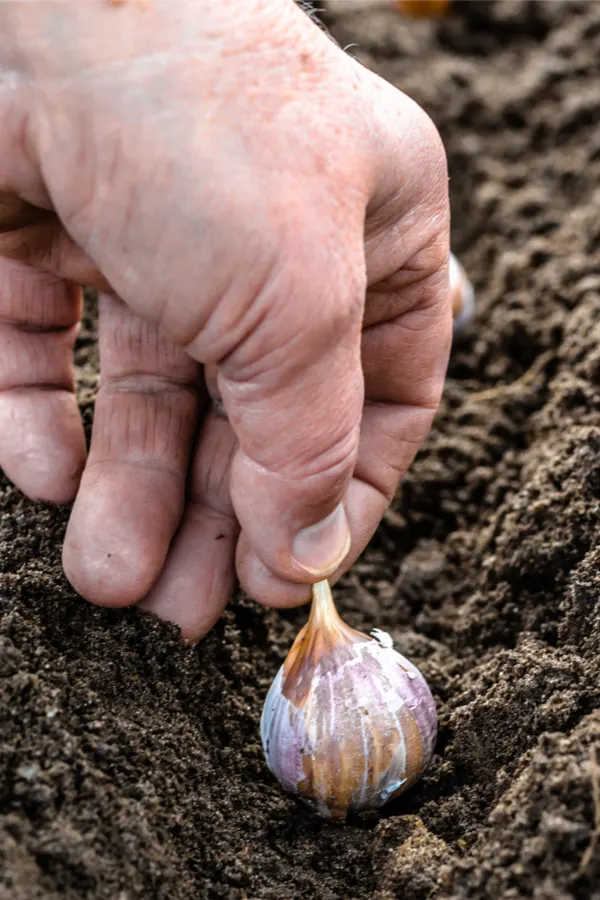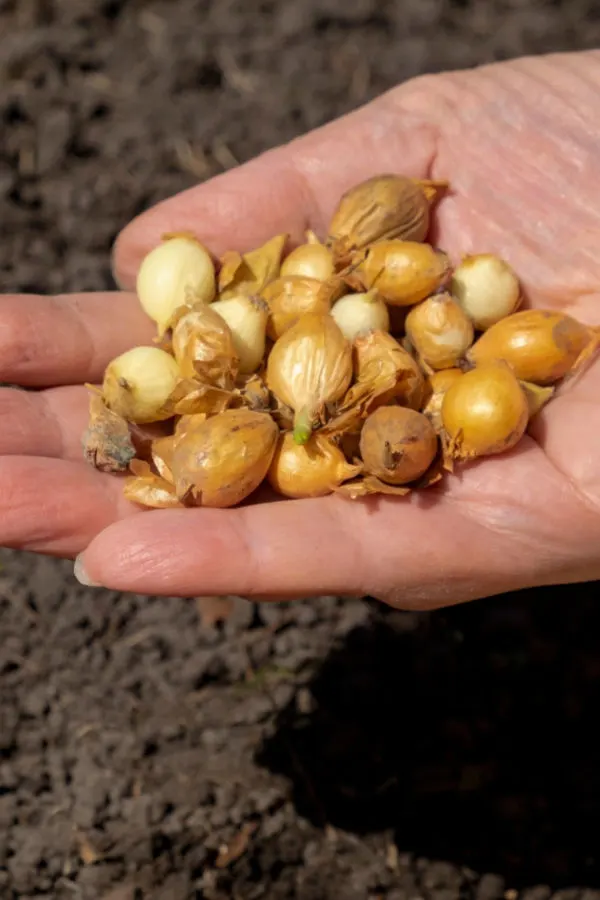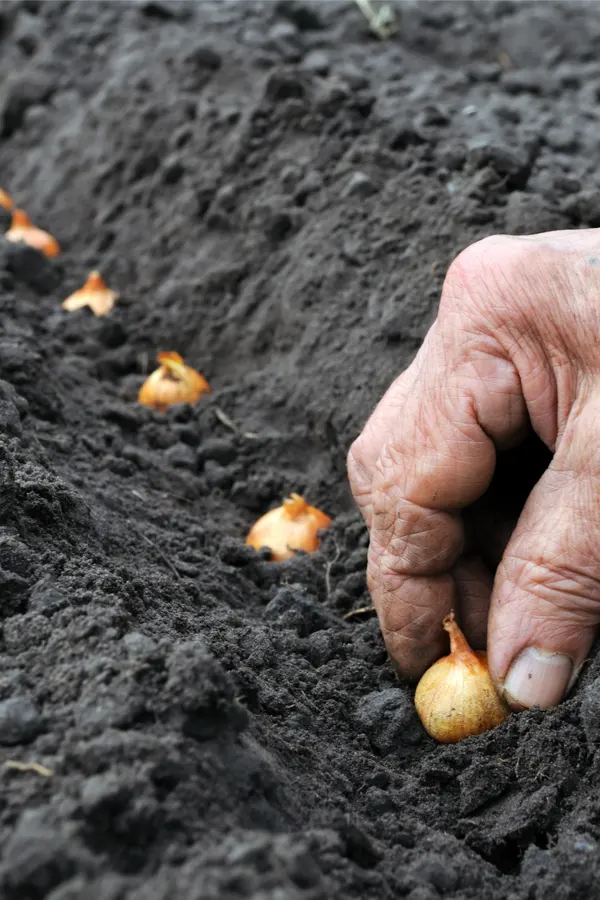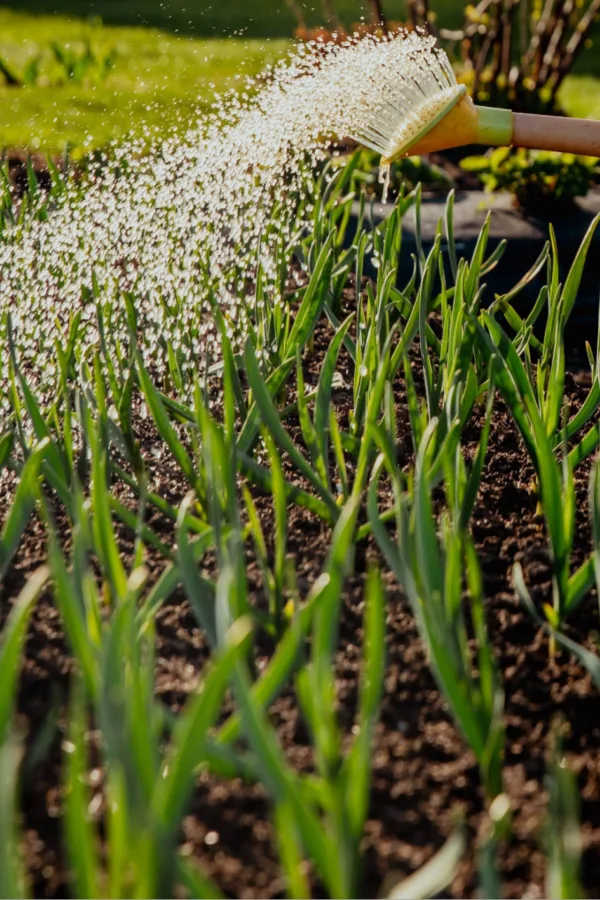Why is fall the best time to plant onions and garlic? Because it gives you the best chance to grow the largest and most flavorful crop of both ever!
Although garlic and onions can be planted and grown as a traditional spring crop in most climates, for those that experience more of a true winter, planting in the early autumn can have several big advantages over spring planting.
Not only does it allow you the opportunity to keep a portion of your garden space productive over the winter months. Even more, fall planting allows both onion and garlic bulbs to grow considerably larger in size. By planting in the fall, the bulbs have a chance to sprout and develop a bit of early growth.
Then, after going dormant through the winter months, they bounce quickly back to life in the spring. By already having a rooted base in the soil, it gives them an incredible head start on developing and growing larger than ever.
But perhaps even better than growing more sizable bulbs, allowing both crops to overwinter in the soil gives them more time to develop a far better flavor profile too!
Growing For Flavor – Why To Plant Onions & Garlic In The Fall
In fact, for us, there really is no comparison when it comes to flavor. It was some 12 years ago that we grew garlic and onions in the fall for the first time – and with one taste, we have never looked back!
We now plant our entire garlic crop in the fall. The flavor and size of the bulbs make spring planting a thing of the past. And although we still plant spring onions each season, it is our fall planted onions that we crave the most when it comes to size and flavor.
With that in mind, here is a look at how we plant both in the fall, along with a few secrets we’ve learned along the way to growing a bountiful harvest!

Why To Plant Onions & Garlic In The Fall
Timing Your Planting To Perfection
When planting a fall crop of garlic or onions, timing is everything. For both vegetables, that means planting to allow six to eight weeks of growth before the cold of winter sets in.
That six to eight week growing time is critical for both crops. It allows them to set good roots before they go dormant for the winter. Those good roots then set the stage for strong growing in early spring. Why not plant even earlier? Because both need the cool weather of fall to flourish.
If you plant too early in the summer, both onion bulbs and garlic cloves can have trouble sprouting and growing. Knowing when to plant really depends on your specific climate.
Here on our Eastern Ohio farm, we usually plant both during the first week of September. But wherever you live, figuring out the timing is fairly easy. All you really need to find out is your average first fall frost / freeze date. (Your county extension office is a great place to ask!) Then, simply count back six to eight weeks and plant accordingly.

Getting Your Bulbs Ready For Planting – Why To Plant Onions & Garlic In The Fall
It’s important to get your bulbs as soon as you can for planting. It can be hard to find onion sets and garlic cloves for planting in the late summer and early fall months. Unfortunately, most garden stores and nurseries start to pare back their plant and seed stock by mid-summer.
The great thing with onion sets and garlic cloves is you can buy them at any point. Both will keep well in a cool, dry place until planting. Onion sets are the better choice than onion seeds for planting in the fall, as they will give you much larger onions next summer. Sets are also easier to weed and maintain in bed spaces than tender young seedlings.
As for garlic, select healthy seed stock for planting. If you are using garlic from your own harvest, select the biggest and best bulbs for planting. This will give you the best chance for success.
When purchasing garlic at a store for planting, make sure it is organic and has not been sprayed. Many store bought garlic varieties are sprayed with insecticides and fungicides that can prohibit sprouting of the cloves.

If you have trouble locating cloves or bulbs locally, you can usually find seed stock on line. We have listed affiliate links for both onion sets and garlic cloves below. Whatever you do, get your seed stock on hand as early as possible!
- Yellow Stuttgarter Onion Sets 8 oz | Non-GMO Bulbs
- Gourmet Chesnok Red Garlic Bulbs Hard Neck – Fall Planting Garlic
Preparing Your Soil – Why To Plant Onions & Garlic In The Fall
Garlic and onions both need to have loose, fertile and well-draining soil to grow best. It not only allows bulbs to grow larger, but also keeps them from rotting in the sometimes overly wet conditions of late fall and early spring.
Prepare your soil well before planting to ensure success. The best way to do this is to add in generous amounts of compost to the bottom of each planting furrow. The compost will provide both the nutrients and improved drainage the bulbs need to thrive.
As for the depth of planting, we plant garlic bulbs three inches deep, and our onions at two inches deep. Whether you are planting garlic cloves or onion bulbs, always plant with the pointy tip of the bulb facing up. This is where they will sprout, and it allows for quicker growth to the top of the soil.
To plant, we first dig a furrow in the soil to create a row. Next, we add around an inch of compost into the bottom of the trench. Once the compost is in, we then plant the bulbs down into the layer of compost. This allows the seed to be surrounded by life-giving nutrients as it sprouts and grows.

Plant Spacing
Both garlic and onions can be planted in rows, or in a wide patch. The good news is that no matter how you plant, they can be grouped closer than you might think. In our 18″ wide raised rows, we plant both crops 3-wide down each row, with 4″ spacing between bulbs.
This closeness not only helps conserve space, but also helps to keep weeding and maintenance to a minimum. In a single 20′ long bed, we can grow close to 80 heads of garlic or onions.
Soak Bulbs Before Planting – Why To Plant Onions & Garlic In The Fall
Here is another big tip before planting in the fall, soak your bulbs prior to planting! Soaking allows the bulbs to absorb moisture before heading into the ground. And without moisture, bulbs simply won’t sprout.
This can be key in late summer and early fall, when the ground can be quite dry. To soak, fill up a 5 gallon bucket of water the night before planting and dump the bulbs in.
We like to add a few tablespoons of pure baking soda to the water. It can help speed germination and protect the bulbs from insects and rot. In fact, the simple task of soaking bulbs can speed up sprout times by a week or more!
Always be sure to use distilled or untreated water for soaking. The chemicals in city or treated water can often affect the bulbs ability to sprout.

Mulching & Watering – Why To Plant Onions & Garlic In The Fall
Perhaps the biggest secrets of all for a great crop of fall planted onions or garlic are proper mulching and watering. It’s important to always keep both crops covered with a good layer of mulch. Not only will mulch help protect the crops through winter, mulch also keeps competing weeds at bay and holds moisture in the soil.
Immediately after planting, cover the bare soil with a thin one inch layer of mulch. Straw works really well as a mulch but you can also use shredded leaves or grass clippings. Once crops begin to emerge in a few weeks, continue to thicken up the mulch. By the time late fall and early winter settle in, your crops should be mulched to a depth of 4 to 6 inches.
This will help to protect your onion and garlic from the harsh winter temperatures and winds. Once spring arrives, simply add a bit of fresh mulch to the top of the rows, and get ready for a great early summer harvest. As for watering, make sure each crop is getting at least one inch of rainfall or hand watering per week.
Here is to planting your own incredible crop of onions and garlic this fall. And – to a great harvest of both next summer. For more on fall planting, check out our article : The Simple Secrets To Planting Tulips In The Fall. Happy Gardening – Jim & Mary.
Old World Garden
Jim and Mary Competti have been writing gardening, DIY and recipe articles and books for over 15 years from their 46 acre Ohio farm. The two are frequent speakers on all things gardening and love to travel in their spare time.
As always, feel free to email us at thefarm@owgarden.com with comments, questions, or to simply say hello! You can sign up for our free email list in the subscribe now box in the middle of this article. Follow us on Facebook here : OWG Facebook. This article may contain affiliate links.

